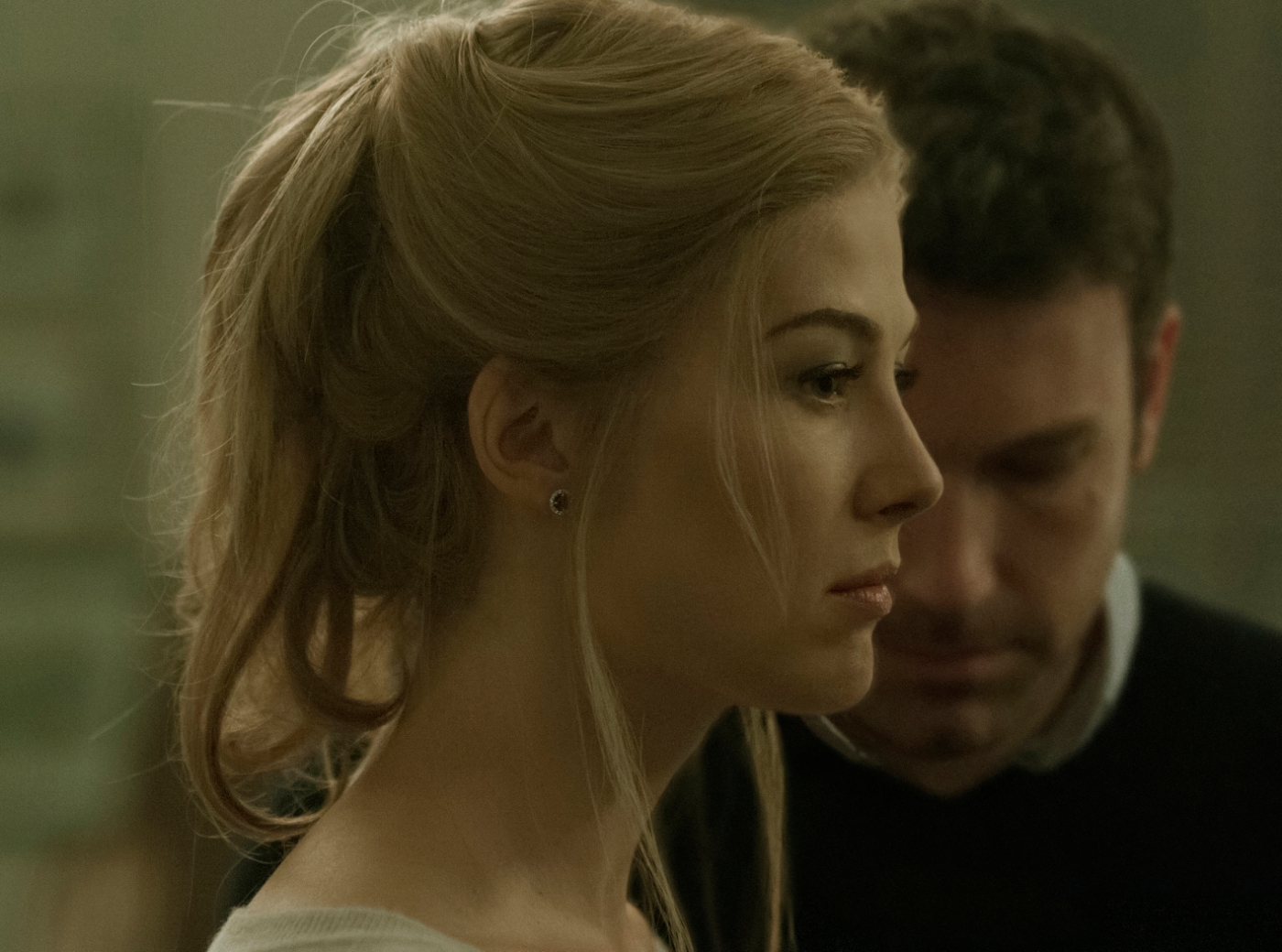Analyzing Gone Girl’s Amy Dunne
Last updated on May 24th, 2025 at 04:19 pm
I recently watched Gone Girl for the first time. (Yes, I know it’s 2023, and I’m behind.) Now, there are so many things that are interesting about this film, from its examination of marriage to its use of POV to how its characters within the story craft narrative. I might write about these things eventually. Right now, I want to talk about Amy. Because I remember when this movie first came out, and the “Cool Girl” speech was everywhere. I was constantly seeing gif sets of that scene, and that was the only thing I really knew about the movie. So, I got the impression that this movie was about the empowerment of women and being what you want to be over what a man wants you to be. And it is not that.
Now, my assumption for this article is that you’ve watched the movie. I’m not going to explain every twist and turn, but there will be spoilers. So, if you haven’t seen it, beware. I’m also focusing entirely on the movie. I might read the book eventually, but right now, I’m more interested in how the film individually handles the text versus how it handles the text as an adaptation.
There seem to be two competing views of Amy within the discourse. One is that she’s evil. She’s a man’s worst nightmare. The other is that she’s a feminist icon. I think both views of Amy are reductive and strip her of the little nuance the movie does give her. So, let’s break it down.
The Men in Gone Girl
Before we really get into it, I do want to touch on the men within this film because all of Amy’s actions are framed through these men, her victims. The entire first half of the movie is primarily Nick’s perspective as he tries to figure out what happened to Amy. We have glimpses of Amy’s POV through her diary entries, but half of those entries later turn out to be false.
Even though, as a woman, I watch the film and understand/empathize with Amy to a certain extent, I’m not sure the film really does. I think the film empathizes with Nick and Desi, who are seen as purely victims of Amy’s schemes and malicious behavior. Now, personally, I think Nick and Desi are great characters and not-great people. Nick is clearly selfish, unfaithful, and angry. (My understanding is that he’s even worse in the book.) Desi honestly makes my skin crawl with his clear desire to possess Amy, specifically the Amy he wants her to be. But because these men are both Amy’s victims, the film doesn’t really dwell on these things too much. It’s too busy spelling out Amy’s evil to really focus on theirs.
Amy as Feminist Icon
In her article for Vox, Emily St. James wrote about how she considers Gone Girl to be the most mainstream feminist movie in years. She writes,
“But open up Gone Girl and dig around in its guts, and you find something surprising. This is perhaps the most feminist mainstream movie in years, a forthright depiction of the ways that society controls women and forces them into certain roles, then lets men basically do whatever they want. Amy Dunne might be a monster, but she’s no sui generis psychopath. No, she’s Frankenstein’s monster, stitched together by a husband, parents, and a social order that demanded she be certain things, rather than who she really was.
And in destroying her husband’s life, she’s symbolically taking back power for women everywhere.”
On some level, I see St. James’s point. Watching Amy at Amazing Amy’s release party and seeing her relationship with Nick, you do understand it on some level. You understand how a woman could be pushed pretty far. You do, on some level, feel bad for her and empathize with her. Women, in general, are forced into different boxes by different people. Amy is Amazing Amy to her parents, Cool Girl to Nick, and perfection personified to Desi. St. James also does an admirable close reading of the film’s framing to make her point. Her examination makes sense to me. I just disagree with her conclusion that Amy is taking back her power throughout the film.
St. James is far from the only person to have this opinion, so I don’t mean to single her out. She’s been through it in the past, and I have a serious amount of respect for her. As I mentioned in my intro, the “Cool Girl” speech was everywhere in 2014, and Amy was definitely upheld as this feminist beacon of light who is pointing out and correcting an imbalance of power. I know people who stan Amy Dunne even though they don’t condone her actions.
But despite understanding her motivations, I don’t understand this perception of Amy as someone to be upheld. To argue she’s taking back the power in this movie feels inaccurate to me. Because, for me, Amy has far too much control over her situation for that. She’s the puppet master behind the whole thing. Everyone, from Nick to Margo to Boney, is affected and hurt by the situation she creates.
Amy and Power
I will say that the middle of the film confuses this conclusion a bit. The only time we see her falter is at the campground when she gets robbed by two people who see right through her. But she regroups and manipulates Desi to improve her situation. Then, you might think Desi is in control because he’s trying to force her back into a box, but she pretty quickly flips that situation on its head too. The reason she does this is because Nick figures out how to get her back. He goes on television and pretends to be the man she wants him to be, and she forms her plan to go back and save him (from her own plan). But once she shows up, she’s immediately in control and makes sure that Nick’s back under her thumb, regardless of his own moment of manipulation.
She’s not taking the power back; she’s simply exerting it and taking it to an extreme conclusion. She’s probably the character with the most agency in the entire film, so I don’t understand how she’s interpreted as this sympathetic character who’s taking back her power.
It’s worth noting that Amy also creates the narrative around herself, especially at the end. To hurt Nick as much as possible, Amy makes herself the perfect victim. Even after her “Cool Girl” speech, she is crafting herself as America’s Sweetheart, the victim of a cruel and obsessed man. She’s the doting, forgiving wife. No one puts her into that box in the end. She puts herself there. She enjoys being adored, and she wants to force Nick into the box with her. Amy Dunne is ultimately the creator of her own narrative throughout the film. She’s too powerful to need to be empowered.
Amy as Evil Maneater
Now, on the other side of the coin, Amy could easily be seen as a man’s worst nightmare in this film. She’s conniving, she makes up damaging lies, and she’s willing to go to unimaginable lengths to control and condemn the men around her. She wraps them in her lies and manages to win and keep the favor of the public.
In an interview in Times, author/screenwriter Gillian Flynn said, “It feels so old-fashioned to think because you write about awful women that you don’t like women. To me it’s worse to only write about good women. I’m tired of women as the supporting character, women as the helpmate, women as the adorably flawed heroine–she can be front and center, but only if she falls down a lot and has trouble with men.”
The author is making the point that we should be able to create women characters who are also villainous, and we should be able to have varied representations of women. I get that, and I agree. The ultimate goal of representation is to be able to have characters that represent the variation you get in real life. There are villainous women out there. Women characters shouldn’t have to uphold a certain standard just because they’re women. From what I understand, the book is far more nuanced than the movie when it comes to Amy too. You get a better sense of her motivations and how her life has impacted her.
In the film, we do get hints of a complicated life. The Amazing Amy release party is the crux of it for me. Amazing Amy has always done what she could not and so has always overshadowed her. As I’ve already said, Nick is a crap partner too. So, overall, I do think this view of her is a bit reductive too. But I think the film fundamentally doesn’t spend enough time on Amy’s interior. This is why it’s so easy to reduce her down to her villainous actions or her “Cool Girl” speech.
Gone Girl is going to haunt me for a while. It’s a fascinating film with a lot going on, but sadly, I think Amy is the least interesting part when she should be the most interesting.
Image Credit: 20th Century Fox


One Comment